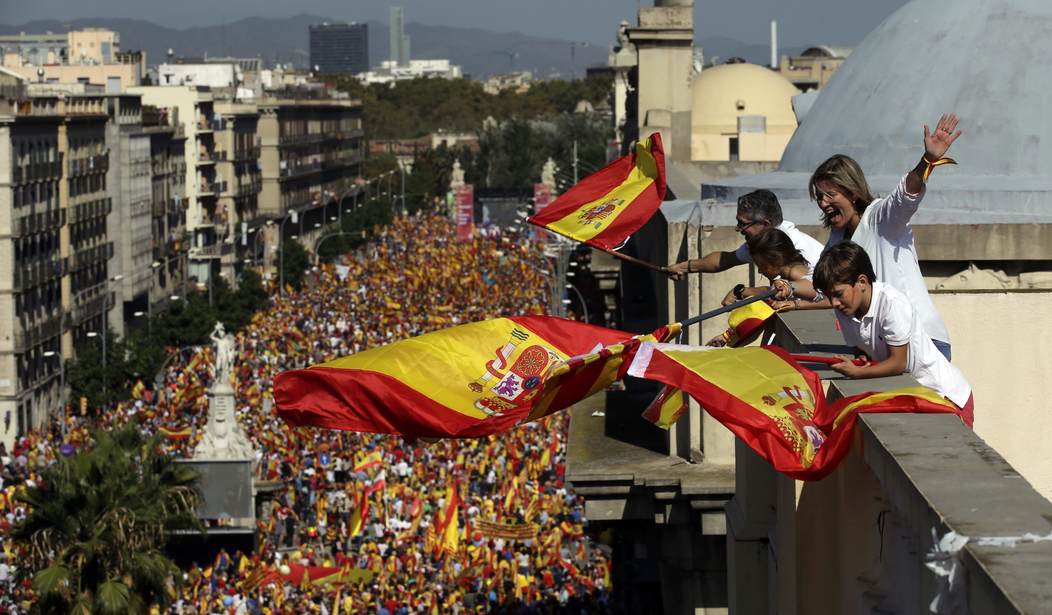Buried in all of the other international news is the following tidbit: the Spanish “autonomous region” of Catalonia held a referendum on independence from Spain, in which some 90% of participants voted for independence.
Catalonia is located in the northeastern corner of Spain, in the foothills of the Pyrenees. Its capital is Barcelona, a major industrial and tourist center, and the region has a long history of off-again, on-again independence dating back at least to the Eighth Century. The Catalan people speak a unique Romance language which has more in common with the Occitan language of southern France than it does with Spanish and, obviously, they have not lost their sense of distinctiveness from the Spanish.
The Spanish government in Madrid reacted to this latest attempt to apply the Wilsonian principle of self-determination for small peoples in much the same way that the Baghdad government reacted to the recent referendum on Kurdish independence. It first declared the referendum unconstitutional, then demanded it be withdrawn when it became obvious that the referendum had gone against continued union with the Spanish state. In other words, the “autonomous region” is demonstrating a little too much autonomy.
People formed long queues in order to vote in the “unconstitutional” referendum, often waiting patiently for hours. They then lingered afterwards in the polling places, fearing the Spanish national police, the Guardia Nacional, would attempt to seize the ballot boxes. As it turned out, their fears were not groundless.
Members of the Guardia Nacional were brought in from other regions of Spain (apparently the locals weren’t considered reliable) to engage in violent suppression of the referendum, which quickly descended into chaos. Dressed in riot gear, they used rubber bullets and truncheons to disperse the voters. Over 750 people were injured in the ensuing riots, according to Catalan officials. The Madrid government countered with the report that dozens of police officers had been injured.
Pursuant to the crackdown, the Spanish state also engaged in some heavy-handed, if futile, political censorship, shutting down the website of the National Catalan Assembly. The website was quickly redirected to an EU domain, which is beyond the ability of the Spanish authorities to suppress.
The fact is that Spain is not a unitary, national state, but rather a conglomeration of regions speaking at least eleven distinct languages.
The various regions were united, by force and through dynastic marriages, under the kings of Aragon and Castile during the Renaissance. This caused Castilian to be recognized as the modern language commonly referred to as “Spanish.” However, some of the regions have long been restive. In particular, there was a decades-long Basque insurgency in northwestern Spain. Now we have the unrest in Catalonia.
It appears likely that not only is the recent referendum the most serious test of Spanish democracy since the end of the Francoist dictatorship in the 1970s, but it may also put Spain in violation of European Union laws. This will put even more strain on the structure of the EU. The Catalonian regional government has sent a letter to the European Commission complaining of the suppression of the website mentioned above, as well as the alleged suppression of individual internet accounts of various members of the Catalonian government who supported the referendum.
It remains to be seen what the response of the European Commission will be, but they hold a strong hand. Spain is one of the EU members which is a net recipient of transfer payments from the EU, and considerable economic pressure could therefore be brought to bear on the Madrid government.
In addition to being a member of the EU, Spain is also a member of NATO, and NATO already has one problem child in Erdoğan’s Turkey.
That’s another polyglot state, about a third of whose territory is inhabited by Kurds, whose very existence had been denied for decades. The official designation for Kurds in the Turkish language was Dağ Türkleri, or “Mountain Turks.” Though that nonsense has ended, there is a solid reason why Turkey and Iran have joined the Baghdad government in attempting to suppress the drive toward Kurdish independence in northern Iraq. They fear their own resident Kurdish minorities will be encouraged by an independent Kurdish state, and the Kurdistan which was a feature of the original treaty ending the Great War — deep-sixed by the British and Ataturk’s nationalist republic — might finally come into existence.
Similar fears seem to dominate the Madrid government: that the Catalan independence movement might encourage other minorities similarly, and democracy be damned.
Given the European Union’s penchant for meddling in conflicts elsewhere in the world, such as the Middle East, perhaps I can make a friendly suggestion. Israel ought to offer her services to Spain and the EU as an “honest broker,” and negotiate an end to the Catalonian crisis on the basis of “land for peace.”
The Catalan people, with their distinctive language and culture, surely have a much better claim than the “Palestinians,” artificially created by Yasser Arafat in 1964, who are in no way different from the Arabs of Israel’s neighbors. They speak essentially the same dialects of Arabic as are spoken in those countries, and possess no distinctive culture of their own.
Let the EU see what it feels like for a change.









Join the conversation as a VIP Member